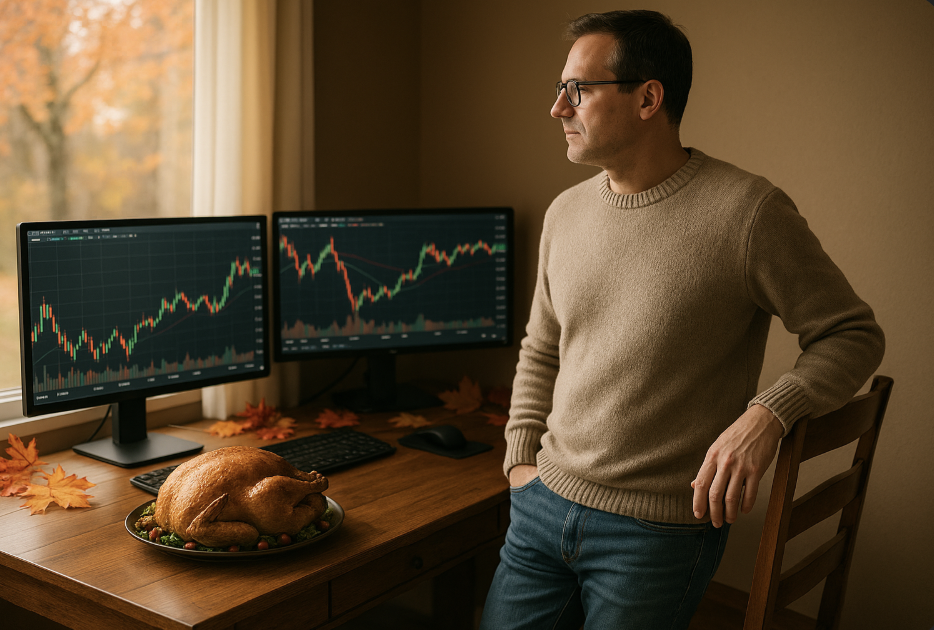The Holiday Crossroads – When Discipline Meets Temptation
The Holiday Crossroads – When Discipline Meets Temptation

Thanksgiving week serves as the ultimate psychological stress test, separating traders who practice gratitude and capital preservation from those driven by greed and FOMO. The discipline to step away and appreciate year-to-date progress proves more valuable than any low-volume trade—and sets the foundation for December success. This week, your greatest edge isn’t a setup. It’s knowing when not to trade at all.
The Greedy Trader’s Trap
The dangerous whisper begins: “I can squeeze one more win before the break.” Low volume amplifies this temptation—bigger price moves look attractive, creating the illusion of opportunity in holiday volatility. Wednesday afternoon trading is where discipline dies, as the greedy trader convinces themselves, “This setup is different.” Greed wears many masks: chasing arbitrary year-end profit targets, desperately trying to “make back” losses before the holidays, fearing you’ll miss out while on time off, comparing yourself to imaginary traders who are “crushing it” on social media. It’s the hedonic treadmill in action—enough is never enough.
The greedy trader holds swing positions through Thursday’s close (ignoring gap risk), increases position size on thin-volume breakouts, trades Friday when everyone else is shopping, revenge trades after Wednesday losses, and dismisses low-volume warnings because “this setup is different.” Spoiler: it’s not.
Institutional traders are gone—you’re trading against algorithms and retail amateurs. Low volume makes every mistake exponentially more expensive. Wide spreads devour profits. Reversals happen without warning or escape routes. You’re fighting both the tape and your own psychology, and both will win. The real damage: stress bleeding into family time, broken stop-loss discipline that carries into December, confidence damage that takes weeks to repair, and the painful truth that your “one more trade” often becomes your most expensive trade of the year.
The Psychology Behind Holiday Trading Temptation
Thanksgiving week triggers a perfect storm of psychological vulnerabilities. Time pressure mounts as year-end approaches. Holiday gatherings amplify social comparison—dreading the “how’s trading going?” questions. Loss aversion drives desperation to end the year on a high note. Boredom whispers, “Markets are open, you’re available, might as well.” FOMO screams you’ll miss the move while away.
The illusion of control is seductive: markets open equals feeling you should be trading. You confuse activity with productivity. “I’ll just watch” becomes “I’ll just enter one position.” Half-day Wednesday proves most dangerous—its false sense of normalcy lures you in right before liquidity vanishes.
Cognitive biases stack against you: recency bias remembers rare holiday winners while forgetting common losses, overconfidence insists “I can handle the low volume,” sunk cost fallacy argues “I’ve traded all year, can’t stop now,” and availability heuristic fixates on big price moves while ignoring absent volume underneath.
The Ultimate Discipline test: Can you sit on your hands when markets are open? Can you choose family and rest over screens? Can you be grateful for what you have versus greedy for more? Can you trust that opportunities will exist next week? Your answers reveal everything.
Taking Inventory: The Thanksgiving Performance Review
Thanksgiving week offers the perfect opportunity to conduct an honest performance review. Identify what worked in 2025: which setups consistently delivered, which risk management rules saved you, which Money Machine parameters performed best, months where discipline was strongest, and trades you’re proud of—measured by process, not just profit.
Equally important, acknowledge what didn’t work: setups that failed repeatedly, psychological triggers that led to bad trades, months where discipline broke down, patterns of repeated mistakes, and times you violated your own rules. This isn’t self-criticism; it’s self-awareness.
Recognize your growth as a trader: skills developed, psychological maturation, progress in emotional control, improvement in risk management, and strategy evolution. Then complete the gratitude exercise—list ten things you’re grateful for in your trading journey: capital still intact to trade another year, lessons learned even from losses, progress made versus where you started, and the simple ability to participate in markets at all.
This review sets the stage for December—historically one of the market’s strongest months. You’ll enter with a fresh mindset after the Thanksgiving reset, clear-headed analysis without pressure, capital preserved and ready to deploy, and lessons from November prepared to apply. Gratitude shifts focus from scarcity to abundance. Recognition of progress builds confidence. Honest assessment prevents December mistakes. Celebrating wins, even small ones, sustains motivation. The greedy trader skips this step and repeats mistakes. The grateful trader learns, grows, and gets stronger.
Resetting for December – The Grateful Trader’s Advantage
December is historically one of the market’s strongest months. The “Santa Claus rally” phenomenon brings institutional traders back with fresh capital, holiday optimism typically fuels bullish sentiment, and it’s your final opportunity to finish the year strong. But you can only capitalize on December if you preserve capital and mental clarity through Thanksgiving.

A week off provides mental refresh. Distance from the daily grind delivers clarity you can’t access while grinding through low-volume noise. Use this time to analyze what worked in 2025, adjust Money Machine parameters based on actual performance data, and gain a fresh perspective without the pressure of having positions at risk.
Productive Activities While Markets Sleep
- Strategic planning: Review top-performing setups, build December watchlists, identify sectors showing strength, and plan position sizing for year-end volatility.
- Mental preparation: Journal about trading psychology patterns; identify emotional triggers to avoid; set realistic December goals; visualize disciplined scenarios; practice gratitude for your journey.
- Technical preparation: Update scanning criteria, test new indicators on historical data, paper trade experimental strategies, clean up workspace, and organize records.
- The Power of Stepping Away: Absence makes the mind clearer. You return hungrier but more disciplined. Fresh eyes see opportunities you’d miss when burned out. Thanksgiving break is a free reset button—use it.
- Coming Back Stronger: Monday after Thanksgiving brings renewed energy. Volume returns, real price discovery resumes. You’re rested while others are exhausted from holiday trading. Your capital is preserved and ready to deploy. Your grateful mindset attracts better decisions.
The grateful trader wins not by trading better during Thanksgiving week, but by choosing not to trade at all. A discipline rooted in gratitude beats a skill driven by greed. Sometimes the best trade is no trade—and this week is that time. This isn’t just about this week’s P&L. It’s your psychological state heading into December, family time versus screen time, discipline that carries into next year, and the pattern you’re reinforcing in your trading psychology. Choose gratitude. Close your positions. Step away. The market will be here Monday—make sure your capital and confidence are too. Visit Trade Ideas to learn how to use the Money Machine to help you navigate this holiday season with finesse as a trader.
